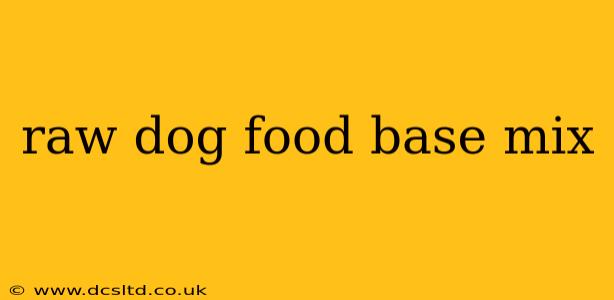Feeding your dog a raw diet can be a rewarding experience, offering potential benefits like improved digestion and a shiny coat. However, creating a balanced raw food base mix requires careful planning and understanding of canine nutritional needs. This guide will walk you through the essential components, considerations, and frequently asked questions surrounding raw dog food base mixes.
What is a Raw Dog Food Base Mix?
A raw dog food base mix provides the foundational elements of a complete raw diet. It typically consists of a combination of protein sources (usually muscle meat), organ meat, and bone. This base mix then needs to be supplemented with additional nutrients and vegetables to ensure a balanced and complete nutritional profile for your canine companion. It's crucial to remember that a "base mix" is not a complete diet on its own and requires careful supplementation.
What are the Key Ingredients in a Raw Dog Food Base Mix?
A well-balanced raw dog food base mix will generally include:
-
Muscle Meat: This forms the bulk of the diet and provides essential protein, amino acids, and fats. Common choices include beef, chicken, turkey, lamb, and fish. The specific choice should depend on your dog's individual needs and tolerances.
-
Organ Meats: These are incredibly nutrient-dense, offering a wide array of vitamins and minerals often lacking in muscle meat alone. Liver, kidney, and heart are commonly included. However, organ meats should be fed in moderation due to their high vitamin A content.
-
Bone: Raw, meaty bones (RMBs) provide calcium, phosphorus, and other minerals, contributing to strong teeth and bones. They also aid in digestion and dental health. Choose appropriate bone sizes to prevent choking hazards. Avoid cooked bones, as they splinter easily and can cause serious injury.
What Supplements are Necessary for a Raw Dog Food Base Mix?
While a raw base mix provides a solid foundation, it's almost always necessary to supplement with:
-
Vegetables: These add fiber, vitamins, and minerals, improving gut health and overall nutrition. Consider adding carrots, green beans, broccoli, and spinach (in moderation due to oxalates).
-
Fruits: Small amounts of fruits like blueberries, apples (without seeds), and bananas can provide additional vitamins and antioxidants.
-
Eggs: A good source of protein, essential fatty acids, and choline.
-
Omega-3 Fatty Acids: Supplementation with fish oil or krill oil can promote healthy skin and coat.
-
Probiotics: These support a healthy gut microbiome, crucial for optimal digestion and nutrient absorption.
The specific supplements and their quantities will depend on your dog's age, breed, activity level, and any pre-existing health conditions. Consulting with a veterinary nutritionist is highly recommended to ensure your dog receives a perfectly balanced diet.
How Do I Store a Raw Dog Food Base Mix?
Proper storage is crucial to maintain the safety and quality of your raw dog food. Keep the base mix frozen in airtight containers or vacuum-sealed bags. Thaw only the amount you need for each feeding and discard any uneaten portions after a few hours.
Can I Make My Own Raw Dog Food Base Mix?
Yes, many pet owners successfully prepare their own raw dog food base mixes. However, it requires significant research, attention to detail, and a commitment to ensuring nutritional balance. Incorrect ratios can lead to nutritional deficiencies or excesses. Consult a veterinary nutritionist to guide you through the process and ensure a balanced recipe tailored to your dog's specific needs.
What are the Potential Risks of Feeding Raw Dog Food?
While raw feeding offers potential benefits, it's crucial to be aware of the risks:
-
Bacterial Contamination: Raw meat can carry bacteria like Salmonella and E. coli, posing risks to both your dog and your family. Thorough hygiene practices are essential.
-
Nutritional Imbalances: Without careful planning and supplementation, raw diets can lead to nutrient deficiencies or excesses.
-
Bone Fragments: RMBs can cause choking or internal injuries if not appropriately sized and supervised.
Is a Raw Diet Suitable for All Dogs?
No, a raw diet may not be suitable for all dogs. Puppies, senior dogs, dogs with compromised immune systems, or those with specific health conditions may require a different approach. Always consult your veterinarian before making significant changes to your dog's diet.
This comprehensive guide provides a foundational understanding of raw dog food base mixes. Remember that responsible raw feeding requires careful planning, research, and ideally, the guidance of a veterinary nutritionist to ensure your canine companion thrives on a healthy and balanced diet. Never hesitate to consult your vet with any concerns or questions.
